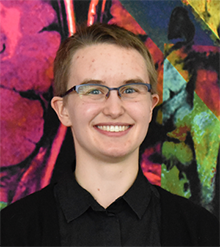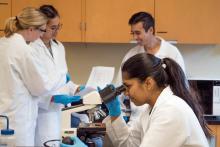Our graduate programs are designed to support PhD students for a period of their research training in laboratories at the NIH Bethesda campus. Successful candidates will have an opportunity to conduct their doctoral thesis research in an NINDS laboratory under the guidance and direction of an investigator who will serve as the trainee's mentor.
The many graduate programs at NIH are available to students who are enrolled in doctoral programs in the biomedical sciences in accredited United States universities. The NINDS research experience is an integral part of the student's academic preparation and will involve close cooperation and planning between NIH and the candidate's academic institution.
All NINDS predoctoral fellows are participants of the NIH Graduate Partnership Program.
UCL-NIMH Joint Doctoral Training Program in Neuroscience
The University College London (UCL)-National Institute of Mental Health (NIMH) Joint Doctoral Training Program in Neuroscience is an accelerated graduate program for exceptional students in neuroscience.
Brown-NIH Program
This program prepares students for a professional career devoted to scientific investigation of the nervous system. This unique alliance between Brown and NIH investigators creates a very broad range of research opportunities.
Key Features of the Programs
- Training in and access to cutting-edge technologies in clinical and basic science research to support the trainee’s dissertation research
- An opportunity to network and exchange ideas with other NIH trainees and investigators, working in a highly collaborative research environment
- Mentorship from leading neuroscience investigators
- Guidance and support in fellowship/grant application processes
- Participation in a professional development series tailored to graduated students—including workshops that focus on essential skills for career success, such as adaptability, interpersonal skills, and cultural awareness
- Professional training in skill sets that support a scientific career, including data science, manuscript and grant writing, scientific talk preparation for various audiences, application preparation, and more
- Individualized advice on professional soft skills, for example networking strategies interviewing, and conflict resolution
Eligibility
Eligibility requirements vary across NIH-University partnerships, but there are many NIH-University partnerships available to US citizens, US permanent residents, or international graduate students. You can find more information about the partnership programs on the NIH Graduate Partnership Program website, including:
- NIH graduate student stipend
- Admission procedure and steps
- Resources that can help you find and choose a mentor
Application Process
There are two pathways into the NIH Graduate Partnership Program (GPP): Institutional or Individual Partnerships. Please use the following links to determine which program best fits your needs and to obtain application information.
GPP Institutional Partnership – the pathway for students applying to a PhD program
GPP Individual Partnership – the pathway for students already enrolled in a PhD program
Meet a Program Trainee

NINDS Mentor: Kenton Swartz, Ph.D.
Kate Huffer (they/them)
NINDS Mentor: Kenton Swartz, Ph.D.
Partnership University: John Hopkins University
Project: Similarities and differences in TRP channel structure and function using computational and electrophysiological technique
Although I was initially interested in pursuing a career in neurology, college coursework and a neurology shadowing opportunity vividly illustrated how inadequate treatment for many neurological disorders can be. As I learned more about how the brain worked, I became interested in the molecular mechanisms underlying diseases and treatments, focusing on basic research in the hope that better understanding would facilitate better treatments.
NINDS has been an amazing place to learn and grow as a scientist, first as a postbac and now as a graduate student. A trainee-led membrane protein journal club has fostered connections with other labs, and through these connections, I’ve been able to expand my scientific skillset to include both laboratory and computational techniques. As I near the end of my graduate work, I am looking for a postdoc opportunity, with an eye toward a future faculty position.

